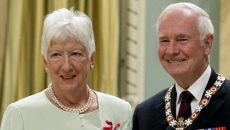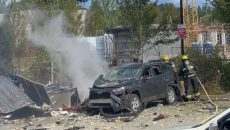Winds will likely be a major factor in the battle to save the southern British Columbia town of Osoyoos from a raging wildfire, but the latest forecast offers some hope.
Environment Canada is calling for northwest winds through the day before gusts of 20 kilometres per hour ease late in the day.
The BC Wildfire Service says that will help push the nearly nine-square-kilometre Eagle Bluff wildfire away from Osoyoos, less than two days after flames sparked in Washington state raced across the Canada/U.S. border on Saturday evening.
The wildfire service says although the blaze remains out of control, it did not grow overnight as crews kept a close watch on its east flank, closest to Osoyoos.
The BC Wildfire Service continues to respond to the Eagle Bluff (K52318) wildfire. This wildfire has been re-named in our coordination with the US Forest Service to match their initial incident name, previously it was referred to as the Lone Pine Creek wildfire. #Osoyoos pic.twitter.com/SRye1CR09x
— BC Wildfire Service (@BCGovFireInfo) July 30, 2023
About 700 properties in the area west of Osoyoos remain on evacuation order, while 2,000 more, including the entire town of Osoyoos, are on evacuation alert.
The wildfire service is reporting more than 350 active blazes around B.C., with just under 200 classified as out of control and 14 ranked as fires of note that are either highly visible or pose potential threats to public safety.
The fight to protect Osoyoos comes as the wildfire danger rating has fallen sharply in recent weeks because of rain and cooler weather in most areas of B.C., except the southern and southeast corners.
That prompted officials in the Prince George Fire Centre, representing the northeast quarter of the province, to announce plans to lift a campfire ban in that region, but the decision was reversed just a short time later.
"Upon further review and with the wildfire season being experienced in B.C., we have made the decision the Category 1 prohibition will remain in effect," the wildfire service said in a social media post on Sunday.
"The decision to implement or rescind a campfire ban is based on science, however as a high level of activity continues around the province, we want to ensure all wildfire personnel are responding to current and potential naturally caused wildfires," the post said.
Elsewhere, a firefighter was killed before the weekend while fighting the massive Donnie Creek fire in northeastern British Columbia, the second such death this month in the province and the fourth in Canada during a record-breaking fire season.
Police said the contract firefighter from Ontario died after his heavy-duty ATV rolled over on a steep gravel road.
The death came just two weeks after 19-year-old Devyn Gale, who was in her third season as a wildfire fighter, was hit and killed by a falling tree while working on a blaze near her hometown of Revelstoke, B.C.






